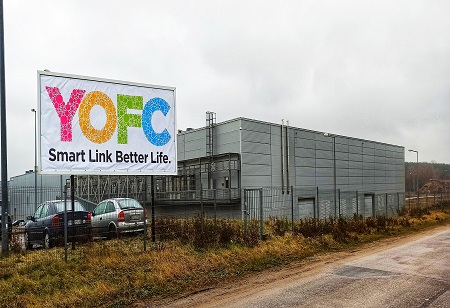
Chinese firm YOFC now to offer fiberoptic tech solutions to customers

 Recently, Pedro Bogarin, the governor of San Martin, visited Peru to meet with Lijing Zhou, Senior Vice President of Yangtze Optical Fibre and Cable Joint Stock Limited Company (YOFC), a leading supplier of optical fibre preforms, optical fibres, optical fibre cables (OFCs), and integrated solutions. Zhou also accompanied Bogarin on a tour of YOFC's data centre in San Martin.
Recently, Pedro Bogarin, the governor of San Martin, visited Peru to meet with Lijing Zhou, Senior Vice President of Yangtze Optical Fibre and Cable Joint Stock Limited Company (YOFC), a leading supplier of optical fibre preforms, optical fibres, optical fibre cables (OFCs), and integrated solutions. Zhou also accompanied Bogarin on a tour of YOFC's data centre in San Martin.
As a crucial component of its efforts to carry out its globalisation strategy, YOFC has been increasing its international footprint in nations and areas targeted by the Belt and Road Initiative since 2014. Over 40 offices have been opened by the company around the world thus far, including ones in Southeast Asia, Europe, Latin America, and Africa. For the first three quarters of 2022, YOFC's foreign business generated sales revenue that made up more than 30% of the company's overall revenue, outpacing the growth of the sector as a whole.
In Peru: YOFC was in charge of procuring land, acquiring pertinent licences, installing OFCs, building support facilities, and supplying and installing communication and support equipment as the lead contractor for a national broadband project in Peru. Over 4,000 local organisations and government entities, including schools, hospitals, police stations, and public squares, have received computer facilities and network services from YOFC in the interim. In addition to finishing the installation of over 7,000 kilometres of OFCs, the construction of over 800 sites, and the installation and commissioning of network equipment for the majority of the transmission sites, the company has so far acquired over 1,000 land plots and related licences for the project.
In the Philippines: In the recent years, YOFC has been actively involved in the DITO project in the four regions of MIN, SLZ, VIS, and NCR. This involvement has spanned the entire project lifecycle, from the selection and production of OFCs and ODN products to the survey design of network solutions, right of way acquisition, construction, and quality inspection of the project. Notably, the Company maintained working on the project in 2020 while the entire world was grappling with the Covid-19 pandemic by collaborating with local personnel in order to finish it on schedule.In the Philippines, YOFC has so far constructed more than 6,500 km of backbone OFCs and helped build more than 1,000 5G wireless sites, enabling fibre optic communication and interconnection for more than 2.6 million customers. As a result, YOFC has helped to raise the nation's share of fibre broadband subscribers from 3.4% to 19%.
In Indonesia: In 2022, YOFC shipped 1.8 million kilometres of OFCs across the nation, with a compound annual growth rate of above 30%. Local clients of the business include anything from large operators, data centres, to national power networks. By signing contracts for six national projects in Indonesia over the past two years, YOFC has also achieved strides in the EPC project sector. The team has made sure that the project will be delivered in a high-quality manner by addressing a variety of difficulties, including the ongoing epidemic and a string of natural disasters.To far, YOFC has carried out engineering projects in 13 cities across the nation, finished the installation of almost 1,000 km of backbone cables, and built over 150,000 km of fiber-optic lines in Jakarta, Bandung, and Palembang. As a result, the business has established itself as a crucial enabler of the nation's digital transformation.
In Poland: Despite the difficulties caused by the epidemic, YOFC began construction of an OFC facility in Poland in March 2021 in order to enter the European market and respond to customer demands more quickly. The plant was put into service in February 2022, producing the first coil of qualified OFCs before reaching its intended capacity in October with the manufacture of the 1 millionth km of qualified OFCs.
In accordance with its purpose of "Smart Link Better Life," YOFC intends to keep putting its globalisation strategy into practise and broaden its global network in order to better satisfy the demands of international clients through its potent local supply and service capabilities.

